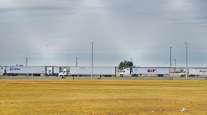U.S. Opens Mexico Border, Gives Permit to First Fleet
This story appears in the Oct. 24 print edition of Transport Topics.
The United States opened its border to Mexican trucks this month for the first time in more than two years, granting Mexico-based Transportes Olympic permission to operate throughout the country as part of a cross-border pilot program.
The flatbed carrier, based in a suburb of Monterrey in the northern Mexico state of Nuevo León, became the first carrier to enter the program when it earned operating authority Oct. 14, the Federal Motor Carrier Safety Administration said.
Transportes Olympic was also the first Mexican carrier to bring a truck into the United States in 2007 in the previous cross-border demonstration program.
“After an extensive safety review, [FMCSA] granted authority to Transportes Olympic to operate commercial trucks beyond the U.S. commercial border zone,” the agency said in a statement.
The same day, Mexico agreed to lift the remaining tariffs it had applied to 99 U.S. products as retaliation when the previous cross-border program ended in 2009, the Mexican Embassy said in a statement. It had removed half of the $2.4 billion in tariffs when representatives of the countries agreed to the program in July.
“This is a big win for American farmers and consumers, who will no longer have to struggle with onerous tariffs imposed by Mexico,” U.S. Transportation Secretary Ray LaHood said in a statement.
The pilot program is the United States’ second attempt to resolve a 17-year dispute between the countries that began when they signed the North American Free Trade Agreement, requiring each to allow access by each other’s trucks.
Other than the 2009 pilot project, the United States never allowed trucks to deliver from Mexico beyond a commercial zone near the border, where freight is transferred to U.S.-based trucks. A 2001 Nafta arbitration panel found that the United States was in violation of the treaty, which gave Mexico the go-ahead to impose retaliatory tariffs.
The United States stopped the first program in March 2009, when Congress passed and President Obama signed a bill stripping funding for it after lawmakers and advocates brought objections (3-16-09, p. 5).
Though the United States pledged to start work on a replacement cross-border program immediately, Mexico implemented the tariffs. It later rotated them to cover different goods (8-23-10, p. 1).
Transportes Olympic is proud to be the first carrier to participate in the program, Guillermo Perez, the company’s transportation manager, told Transport Topics.
“To be, again, the first company to enter this pilot program is quite an accomplishment for us,” Perez said.
Unlike the 2007 program, FMCSA must certify individual drivers and trucks, so the company has two drivers and two trucks in the program.
Prior to the authority being granted, FMCSA officials traveled to Transportes Olympic’s headquarters for a pre-authorization safety audit.
“There’s a lot paperwork to do, and a lot of certification that you have,” Perez said.
The carrier enrolled its drivers in English courses for a basic language test FMCSA conducted, Perez said.
Transportes Olympic focuses on exporting, Perez said. It planned its first trip under the program for Oct. 21 or Oct. 22, after TT went to press.
Opponents of the program came out in full force after news of Transportes Olympic’s operating authority spread.
“As I have said many times, a cross-border trucking program stands to have significant impacts on safety, security and job loss,” Rep. Peter DeFazio (D-Ore.), ranking member of the House subcommittee on highways, said in a statement. “Until these impacts are fully addressed, we should put the brakes on cross-border operations.”
The Teamsters union and the Owner-Operator Independent Drivers Association, both of which have sued to stop the pilot program, lambasted it in an Oct. 19 press conference near the border in Otay Mesa, Calif.
But groups that are now free from Mexico’s tariffs rejoiced.
“We’re obviously very, very pleased,” John Keeling, executive vice president of the National Potato Council, told TT.
Retaliatory tariffs on potatoes caused the U.S. industry to lose about half of its $50 million in annual sales to Mexico before the tariffs were rotated and sales increased slightly, Keeling said.
“It makes a big difference, particularly for us in terms of French fry exports to Mexico, because we compete directly with Canada,” he said.
“America’s pork producers are pleased that the United States is living up to its obligations under [Nafta] by allowing Mexican trucks to haul goods into our country,” Doug Wolf, president of the National Pork Producers Council, said in a statement.
American Trucking Associations also welcomed the end of the dispute.
“We’re pleased that after years of delay, and untold billions in economic damage, the Obama administration has found a way to live up to our obligations under [Nafta],” ATA President Bill Graves said in a statement.
Dan England, ATA’s new chairman, said the lifting of the tariffs will benefit C.R. England Inc., the refrigerated carrier of which England is also chairman. C.R. England exports to Mexico many products that were subject to the tariffs, he said.




